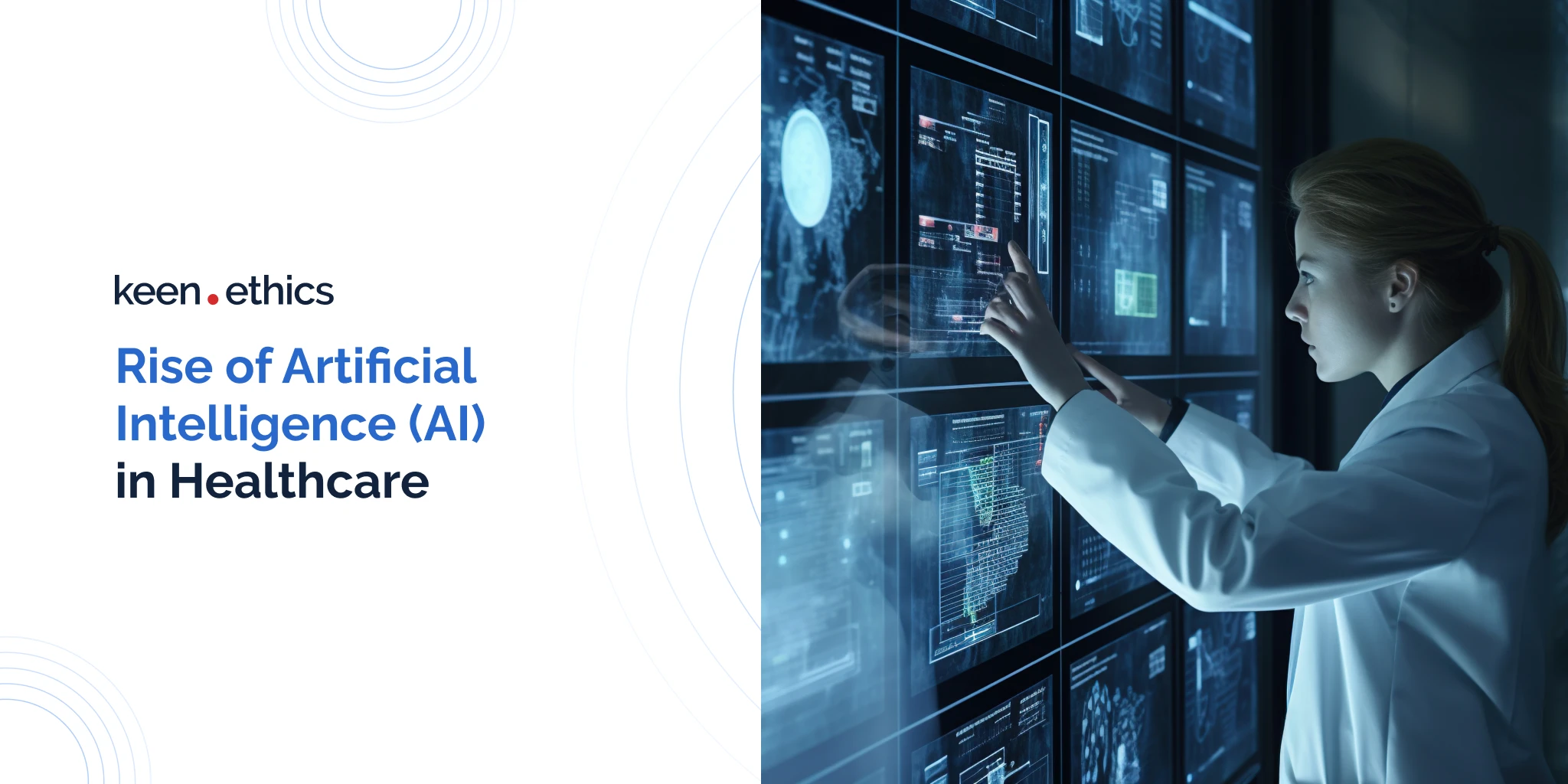AI in healthcare: exploring the potential for artificial intelligence in the healthcare sector.
Have you ever thought about the ways the integration of AI in healthcare can contribute to more personalized and patient-centric approaches to medical care? Or, what challenges and opportunities can be in the collaboration between healthcare providers and AI systems, particularly in terms of trust and decision-making?
If yes, in this article, we’ll look at the rise of AI in healthcare, exploring its significance, challenges, and the profound impact it promises to have on the future of medicine.
What Is AI in Healthcare?
AI in healthcare means using smart computer technology like machine learning and data analysis in different parts of the healthcare field. This new approach relates to making medical tasks, finding out what’s wrong with patients, and taking care of them better by using advanced computer programs. Whether it’s predicting diseases early or creating individualized treatment plans, AI in healthcare is bringing in a new time of getting things done faster, more accurately, and with better results.
In the ever-evolving landscape of medicine, the importance and significance of Artificial Intelligence are nothing short of revolutionary. From early disease detection to streamlining complex procedures, AI is reshaping the way we approach healthcare. AI promises a future where precision, innovation, and improved outcomes converge for the benefit of humanity.
The Significance of AI in Healthcare: Exploring its Impact
The implementation of Machine Learning and Deep Learning is extensive to achieve a higher quality of service and quality of health to patients, doctors, and healthcare professionals.
For example, machine learning can make a dermatologist’s job easier. ML can help with things like figuring out skin issues and creating personalized treatments. Recent improvements in ML programs include handling digital data, like electronic medical records and images, along with faster computers and cheaper ways to store data.
A deep learning model, in turn, can also be used by healthcare organizations and pharmaceutical companies to identify relevant information in data that could lead to many important things. They are drug discovery, the development of new drugs by pharmaceutical companies, and new treatments for diseases.
How AI is Reshaping Healthcare?
AI is transforming healthcare by making it more accurate, personalized, preventive, and efficient, ushering in a new era of innovation and improved patient care. To be exact, there are 4 concrete ways of how artificial intelligence can alter healthcare.
Smarter Diagnostics
AI is revolutionizing healthcare by offering more accurate and efficient diagnostics. Machine learning algorithms can analyze vast amounts of medical data, from imaging results to patient records. This, in turn, leads to quicker and more accurate diagnoses, enabling medical professionals to intervene earlier and improve patient outcomes.
Personalized Treatment Plans
AI’s ability to process and interpret individual health data allows for the creation of personalized treatment plans. By considering a patient’s unique lifestyle and/or medical history, AI can recommend tailored interventions.
Predictive Analytics for Preventive Care
Additionally, artificial intelligence plays a crucial role in predictive analytics. In other words, AI can help healthcare professionals foresee potential health issues before they become critical. This is possible by analyzing historical patient data and identifying risk factors.
Efficient Administrative Processes
AI streamlines administrative tasks in healthcare. Automated systems can handle appointment scheduling, billing, and data management. Obviously, such an approach helps healthcare specialists focus more on patient care.
Key Areas of Influence for Artificial Intelligence in Healthcare
As it was mentioned above, AI continues to transform healthcare in a number of ways. Yet, there are two other key areas of influence for AL in the healthcare industry. They’re virtual health assistants and cybersecurity and data privacy.
Virtual Health Assistants
AI-powered virtual assistants and chatbots are transforming patient engagement and support. These tools provide information, answer queries, and offer ongoing monitoring, improving patient education and adherence to treatment plans.
Cybersecurity and Data Privacy
Given the sensitivity of healthcare data, AI plays a crucial role in enhancing cybersecurity measures. AI algorithms can detect and prevent potential security breaches, safeguarding patient information and ensuring data privacy.
The Benefits and Advancements of AI in the Healthcare Sector
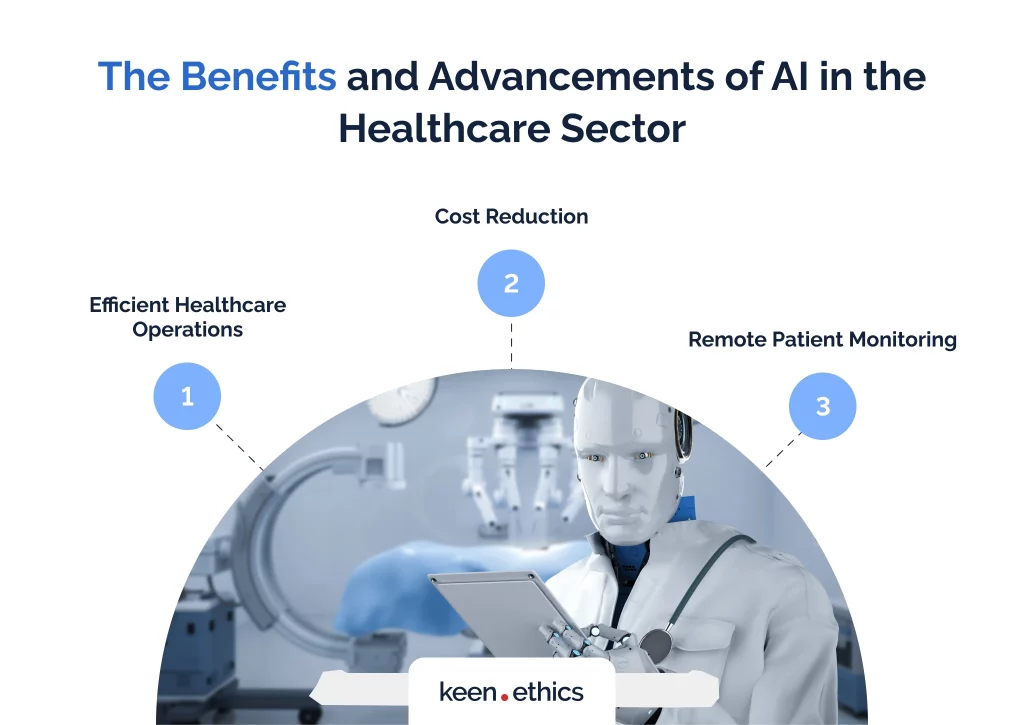
Although there are numerous benefits of AI in the healthcare sector, it’s important to focus on 3 of them:
Efficient Healthcare Operations
To start, the major benefit of AI in healthcare is that it streamlines administrative tasks, automating processes like appointment scheduling, billing, and data management. This not only reduces the workload on healthcare staff but also increases operational efficiency, allowing professionals to focus more on patient care.
Cost Reduction
Through increased efficiency, early detection, and preventive care, AI has the potential to reduce healthcare costs. This is particularly important for optimizing resource allocation and making healthcare services more accessible.
Remote Patient Monitoring
AI facilitates remote monitoring of patients, allowing medical providers to track vital signs and health metrics in real-time. This, in turn, enables proactive intervention and personalized care, particularly for individuals with chronic conditions.
The Roadblocks to Integrating AI in Healthcare
As AI continues to make progress in healthcare, it’s still essential to recognize the challenges that come with this innovation.
Algorithmic limitations
One key challenge is the potential for biases within algorithms, influenced by the data used for training. If not carefully addressed, these biases can result in disparities and affect the accuracy of AI-driven decisions. So, navigating these algorithmic limitations is crucial to ensuring the ethical and correct deployment of AI in healthcare.
Data access limitations
Data access limitations pose a significant challenge too. Without continuous access to different types of data, it might be hard to develop and teach AI models. This could make them less effective in giving useful and complete information for healthcare.
Regulatory barriers
Another challenge of integrating artificial intelligence in healthcare is related to regulatory barriers. The existing regulatory framework may not keep pace with the rapid development of AI technologies in healthcare, creating uncertainties and challenges in compliance.
Popular Applications of AI in the Healthcare Industry
Diagnostic Imaging
Such apps assist in interpreting medical images, such as X-rays, MRIs, and CT scans. Machine learning algorithms can quickly analyze images, aiding radiologists in detecting abnormalities and improving diagnostic accuracy.
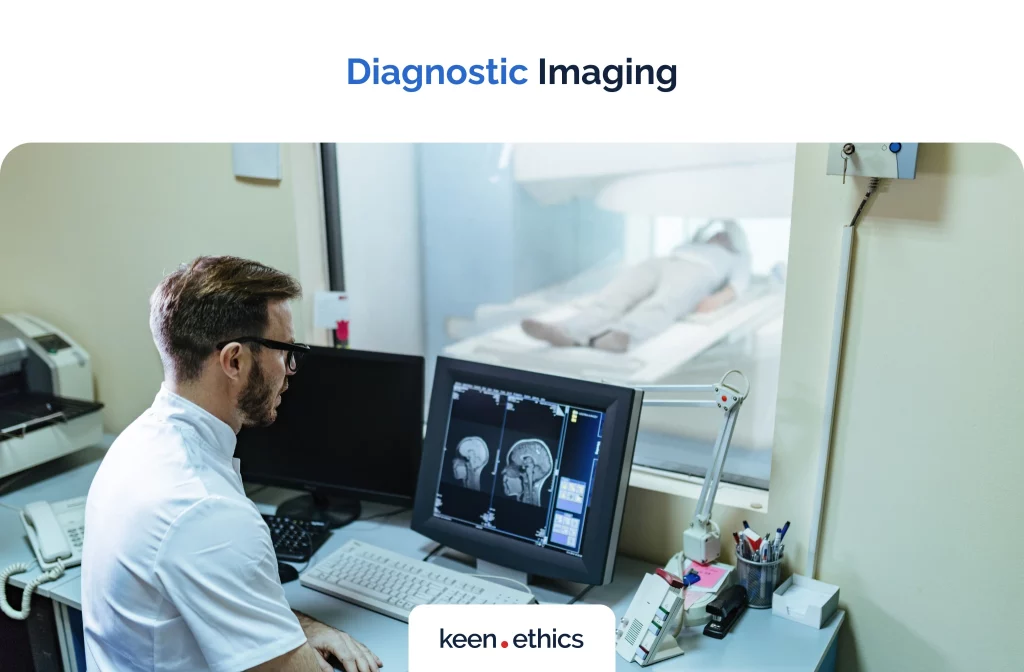
Personalized Medicine
Personalized medicine apps utilize individual patient data, including genetics and medical history, to tailor treatment plans. This personalized approach enhances treatment effectiveness, reduces side effects, and improves patient outcomes.
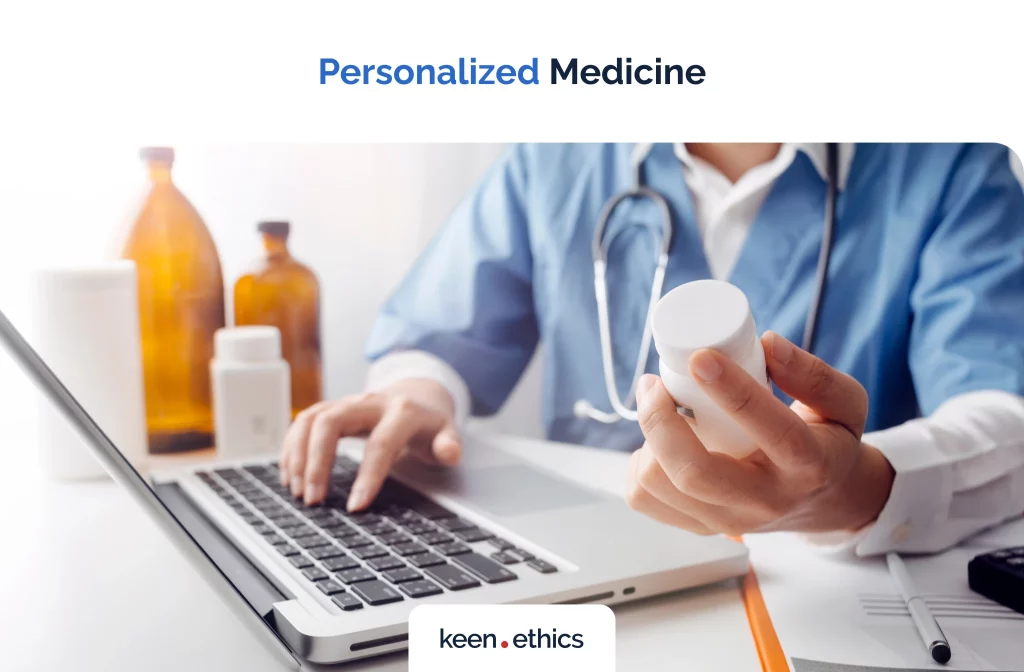
Predictive Analytics for Disease Prevention
Disease prevention apps can analyze patient data to predict and prevent potential health issues. By identifying patterns and risk factors, healthcare providers can intervene early, implement preventive measures, and improve overall population health.
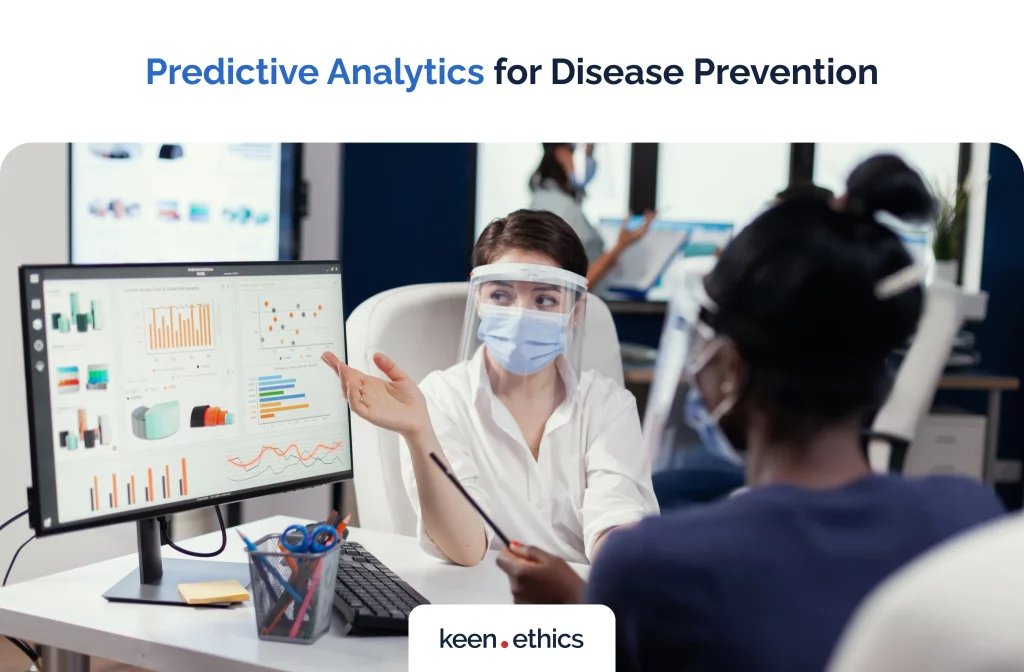
The Future of AI in Healthcare
The future impact and development of AI in healthcare is characterized by a groundbreaking era of innovation, reshaping the landscape of patient care and medical practices. As AI technologies continue to evolve, we can anticipate a shift towards more personalized and precise medicine. It’s now obvious that treatment plans tailored to individual genetic profiles and lifestyle factors will become the norm, optimizing therapeutic outcomes and minimizing side effects. Moreover, the integration of AI in preventive care will enable healthcare providers to anticipate and address potential health risks proactively, ultimately reducing the burden of diseases on individuals and healthcare systems.
With the promise of streamlined administrative processes, enhanced cybersecurity, and advancements in robotic-assisted surgeries, the future of AI in healthcare holds the potential to create a more efficient healthcare ecosystem.
Conclusion
To sum up, the rise of artificial intelligence in healthcare marks a transformative epoch, promising to redefine the way we approach medical practices and patient care. The undeniable potential of AI to revolutionize disease prevention, treatment, and healthcare delivery underscores its significance in shaping a future where precision, efficiency, and improved patient outcomes are at the forefront of medical advancements. The rise of AI in healthcare shows to be a profound shift that holds the promise of creating a healthier and more connected world.
Are you looking for assistance in AI development services? Keenethics is a healthcare software development company that can help you create a healthcare app that will stand out. Contact us now!
Common Questions About
What is the influence of AI on the healthcare sector?
AI is profoundly influencing the healthcare sector by enhancing diagnostics, personalizing treatment plans, streamlining administrative tasks, and enabling proactive preventive care.
What are the benefits of AI in healthcare?
The main benefits of AI in healthcare are:
- efficient healthcare operations;
- cost reduction;
- and remote patient monitoring.
What are the challenges of AI in healthcare?
The challenges of AI in healthcare include concerns about data privacy and security, the need for robust regulatory frameworks, integration with existing healthcare systems, addressing biases in algorithms, ensuring transparent decision-making, and fostering widespread adoption among healthcare professionals.

